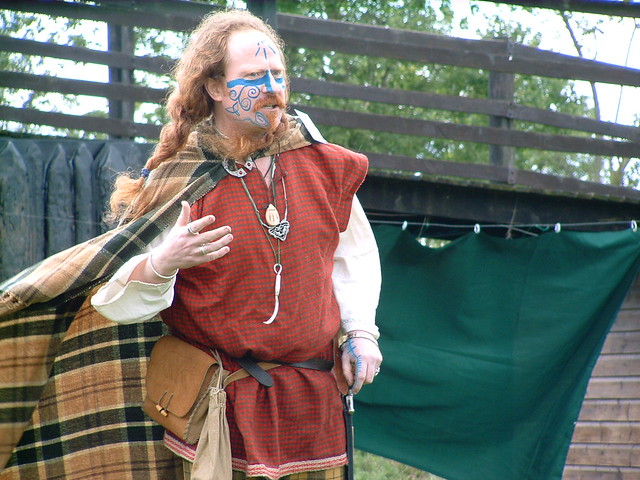Words for oak (tree) and related things in Celtic languages.
Words marked with a * are reconstructions.
| Proto-Celtic | *daru [d̪ˠaɾʲ] = oak |
|---|---|
| Gaulish | Dervo = used in placenames |
| Old Irish (Goídelc) | dair [d̪ˠaɾʲ] = oak |
| Middle Irish (Gaoidhealg) | dair, daur = an oak, the letter D in the Ogham alphabet (ᚇ) dairbre, dairbhre = an oak, oakling, a grove of oak grees, an oak wood dairde, daurde = oaken dair-ḟid, dauruth = an oak wood |
| Irish (Gaeilge) | dair [d̪ˠaɾʲ] = oak, the letter D in the Ogham alphabet (ᚇ) dairbhre = oaks, oak-grove daireach = planted with / full of oaks doire [ˈd̪ˠɛɾʲə] = oak-wood; wood, grove, thicket |
| Scottish Gaelic (Gàidhlig) | dair [darʲ] = oak (archaic), the letter D, ᚛ᚇ᚜ in Ogham dairbhre = oak, nursery or grove of oaks darach [darəx] = oak, oaken, made of oak; ship (poetic) darag [darag] = small/dwarf oak, stunted/branchy tree (which is not useable for working) |
| Manx (Gaelg) | darragh = oak, oaken, oak grove, oak wood darrag = oak, beam, cast (fishing), snood, hairline darree = oak |
| Proto-Brythonic | *dar [ˈdar] = oak tree |
| Middle Welsh (Kymraec) | dar, dâr = oak derwd(y) = oak house, oratory, prayer house, coffin derwin, deruin = make of oak, oaken, abounding in oaks, strong, robust, oak timber |
| Welsh (Cymraeg) | dâr [ˈdaːr] = oak tree, foremost warrior, leader, mighty lord derw = oak trees derwen [ˈdɛrwɛn] = oak tree derwin = make of oak, oaken, abounding in oaks, strong, robust, oak timber der(w)lwyn = oak grove, oak wood |
| Old Cornish | dar = oak |
| Middle Cornish (Cernewec) | dar = an oak |
| Cornish (Kernewek) | dar [daːr / dæːr] = oak derwen = oak tree derw = oak trees |
| Old Breton | daeru = oaks |
| Middle Breton (Brezonec) | deru = oaks |
| Breton (Brezhoneg) | dar [dɑːr] = oak derv [ˈdɛrw/ˈdɛː.ro] = oaks dervenneg = with oak trees dervoed [dɛʁwət] = oak grove, oak wood |
Etymology: from the Proto-Indo-European *dóru (tree) [source].
Words from the same Proto-Celtic root possibly include làrix (larch) in Catalan, lariks (larch) in Dutch learag (larch) in Scottish Gaelic, larch in English, Lärche (larch) in German, and lærk (larch) in Danish [source].
Words from the same PIE root include δόρυ (dóry – spear) in Greek, dervà (tar, resin) in Lithuanian terva (tar) in Finnish, dearbh (sure, certain) in Irish, tree, trim, and trough, true in English, and trä (wood) in Swedish [source].
| Proto-Celtic | *tannos = green oak |
|---|---|
| Gaulish | *tannos = oak |
| Old Irish (Goídelc) | tinne = holly, elder |
| Middle Irish (Gaoidhealg) | tinne = holly, elder, the letter t in the Ogham alphabet (ᚈ) |
| Irish (Gaeilge) | tinne = the letter t in the Ogham alphabet (ᚈ) |
| Scottish Gaelic (Gàidhlig) | teine/tinne [tʲenə] = gorse, whin, furze (archaic), the letter t (ᚈ) in Ogham |
| Welsh (Cymraeg) | taneru, tener(i)o = to tan (hide) tanerdy = tannery tanerwr = tanner (of hides) |
| Old Cornish | tannen = oak (?) |
| Middle Cornish (Cernewec) | tonnen = bark glastanen, glastennen, glastan = (scarlet) oak |
| Cornish (Kernewek) | glastanen gelyn = holly/holm oak glastanen gork = cork oak |
| Middle Breton (Brezonec) | glastann(enn) = holm oak(s) |
| Breton (Brezhoneg) | tann [tānː] = sessile oaks tannañ = to tan glastann = holm oaks |
Note: the Welsh words were borrowed from English tanner, which ultimately comes from Proto-Celtic *tannos, via French, Latin and Gaulish.
Etymology: from Proto-Celtic *(s)tannos, the Proto-Indo-European *(s)dʰnwos/*(s)dʰonu (fir). Words from the same Proto-Celtic roots, via Gaulish and Latin tannum (oak bark), include tan (pulped oak bark used in the tanning process of leather) in French, tano (stem, slip) in Galician, tanería (tannery), Tannenbaum (fir tree, Christmas tree) in German, θάμνος (thámnos – bush) in Greek, and tan, tannery, tannin (tannic acid) in English.
Words from the same PIE roots include thanë (cranberry bush) in Albanian, and धनु (dhanu – bow) in Sanskrit. [source].
Sources: Wiktionary, Etymological Dictionary Of Proto Celtic, In Dúil Bélrai English – Old Irish glossary, eDIL – Electronic Dictionary of the Irish Language, Teanglann.ie, Am Faclair Beag, An etymological dictionary of the Gaelic language, Fockleyreen: Manx – English Dictionary, Online Manx Dictionary, Gaelg Corpus, Geiriadur Prifysgol Cymru, Lexicon cornu-britannicum : a dictionary of the ancient Celtic language of Cornwall, Gerlyver Kernewek, Devri : Le dictionaire diachronique du breton, Dictionnaires bilingues de Francis Favereau / Edition Skol Vreizh, TermOfis






